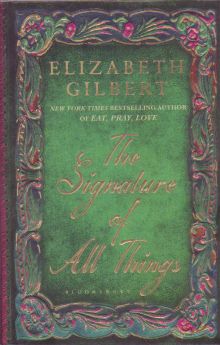Gilbert Elizabeth
The Signature of all Things

Whereas Gilbert´s first bestseller “Eat, Pray, Love” is autobiographical, this, her latest novel, returns to the topic of “The last American Man” from 2002, a biography of a modern naturalist.
And it is the story of the 19th century, as her heroine Alma Whittaker is born in 1800 and dies around 1880. She is born into the richest family of the world. Her father Henry Whittaker founded a world-wide empire of trade with medicinal and rare plants and raised his only daughter to become a natural scientist in her own right.
Gilbert puts all her narrative skill into developing and describing Alma´s character and progress in life, but she does not grant her personal happiness. Alma is always Daddy´s daughter, caring for her ailing father, until he dies in his nineties. A short marriage with Ambrose Pike, a gifted painter of orchids, does not bring fulfillment, but only more sorrow for Alma. Her main consolation is the study of mosses, the smallest and least conspicuous of plants, with their slow and secret life almost a symbol for Alma´s own existence.
A brief stay in Tahiti, where she has banned her husband to die in a complicated homosexual affair, makes Alma only more unhappy. But on the one year long voyage back to Holland she writes her thesis of the development of species “The Theory of competitive alteration”, meaning, that only the fittest and most adaptable species survive in the constant battle of evolution. Her wealthy uncle in Holland, with whom she ist staying , urges her to publish her revolutionary ideas, but she cannot bring herself to do it, because she has not yet solved the role of self-sacrifice in human behaviour in evolution.
When Charles Darwin publishes his “On the Origin of Species” in 1858 she recognizes her own ideas in his work, and later in that of Alfred Russel Wallace. In the end she dies without the world ever knowing that she is the real genius.
A fascinating story, not unlike Daniel Kehlmann´s “Die Vermessung der Welt” but told with a lot more compassion and sometimes a bit too much eloquence.